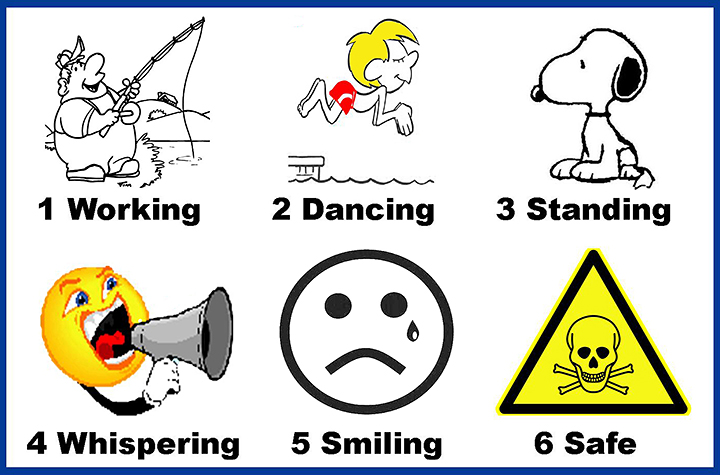
Do our everyday words and political rhetoric really matter?COFFEE WITH WARREN, with Warren Harbeck |

|
Does anything seem strange about the words labelling each of the actions illustrated by these six drawings? Graphic by Warren Harbeck using Adobe Clip Art So, you’re feeling the need for a break from the office routine and decide to go fishing. You’re suspecting the boss might not approve of your self-declared paid holiday, however, so you phone the office and leave a message that you’ll be working at home all day on a contract. Or a politician justifies appealing to the lowest values among potential voters on the grounds that he or she can say whatever they “have to” in order to win. After all, words are just a handy way to achieve a desired end – just rhetoric, right? Do our words really have to agree with our actions? More about that in a moment. First, here are some responses to last week’s column on handshakes and meaning what we say: Calgary coffee companion and prominent photographer Neil Koven sees the gesture as an indication of character. “A handshake is a ‘pressing of the flesh’ and the physical contact makes it a promise and a representation of one’s own integrity.” Sandy McLeod, writing from Kaslo, BC, sees this as a matter of trust. “The handshake exemplified honesty, willingness to work together, and mutual support through thick and thin,” he says. It has important implications for “international relations and mutual belief in each other.” Cochrane reader Marlis McDouall is especially impressed by the sacred circle around the handshake in the Stoney Nakoda flag. “The circle embraces ‘you’ and ‘me.’” It’s about trust and hope, she says, “such important ingredients to our lives.” Now back to this week’s topic: Does what we say really matter? I’ve included a chart of labelled actions. Does something seem strange about the words accompanying the drawings? So what if I call the action of swimming “dancing”? Does it really matter that I’ve euphemized yelling as “whispering”? Or labelled sitting as “standing,” or being sad as “smiling”? Or something poisonous as “safe?” I mean, they’re just words, right? But just like our actions, words have consequences. I heard of a case recently involving a teenager who was charged with “conveying false information with the intent to alarm” – similar to the classic example of falsely yelling “Fire!” in a crowded theatre. Is it really the speaker’s fault if people take the words dead seriously? “Dead” seriously? What about those theatre-goers trampled to death in their attempt to flee? What about lies against fellow students posted on school lockers that resulted in suicides? What about the growing interethnic and interreligious tensions resulting from recent inflammatory political rhetoric in the U.S.? Indeed, speaking itself is an action, and what we say really, really does matter. I’ll close with a question for many of my fellow Christians who seem to judge words and actions by two different standards. What do we do with this warning Jesus gave (Matthew 12:36): “On the day of judgment you will have to give an account for every careless word you utter”?
© 2016 Warren Harbeck |